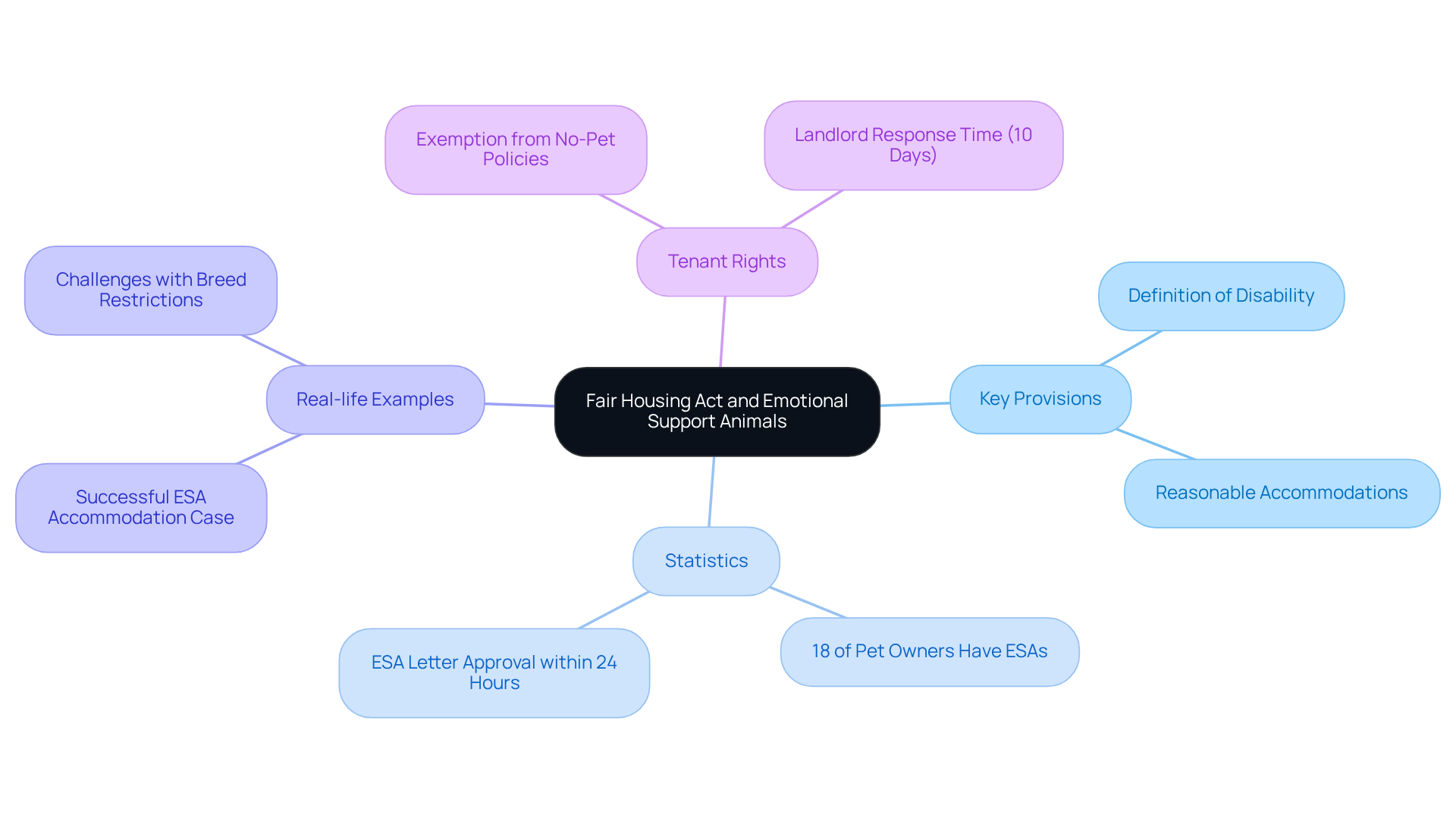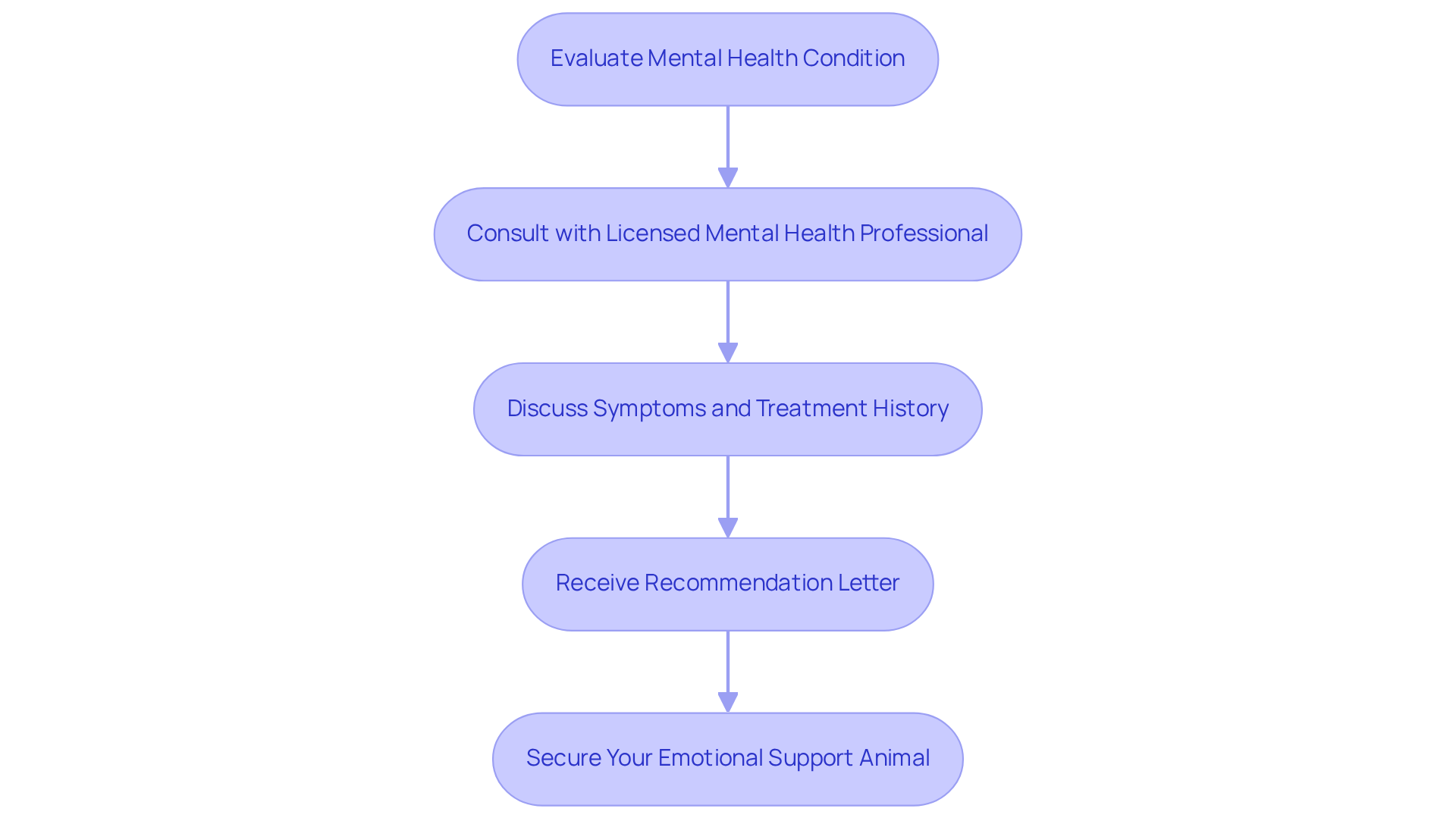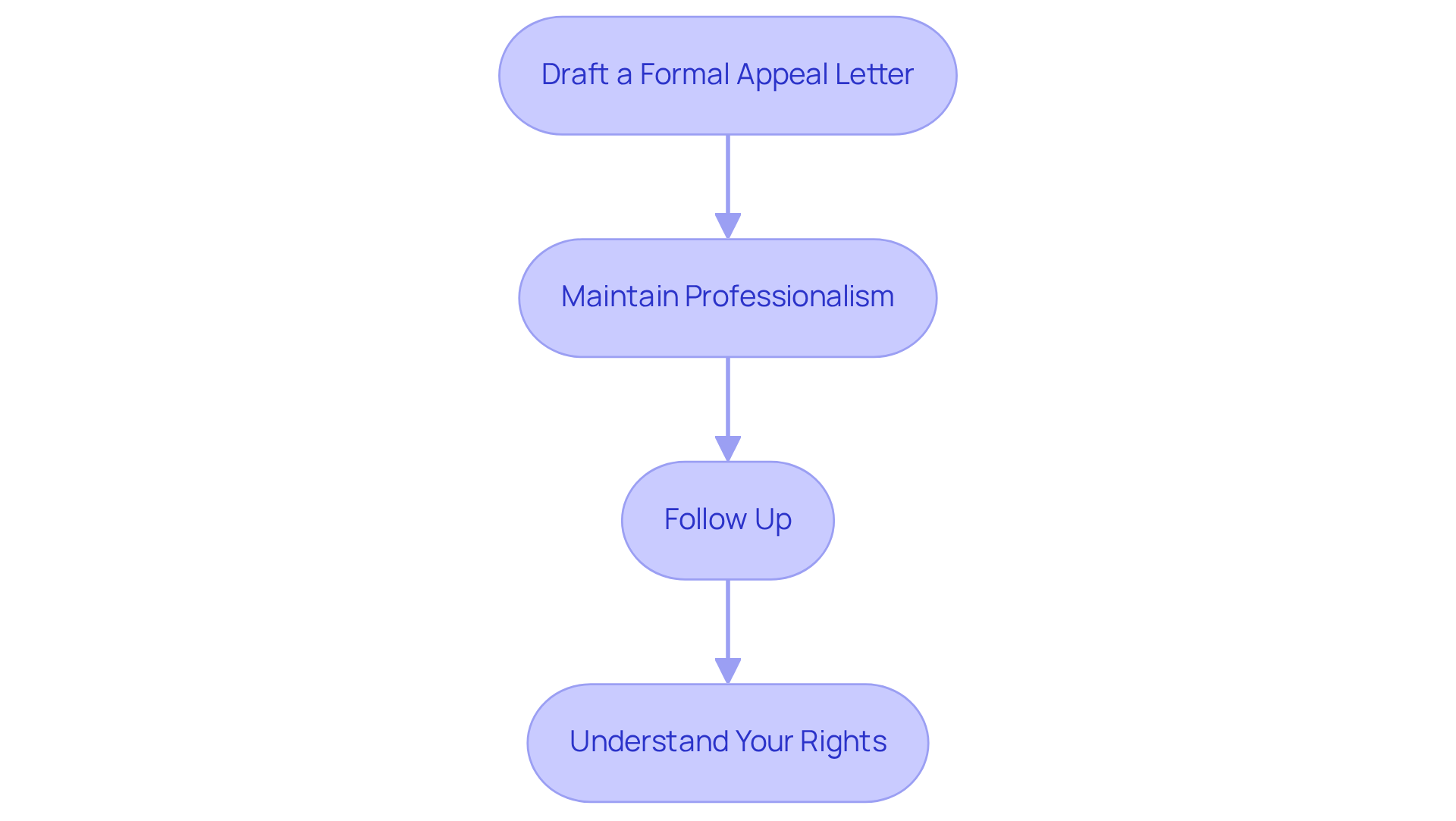

Navigating the Fair Housing Act for Emotional Support Animals
by Lena Park
Last updated: July 18, 2025
Verified and Approved by:
Angela Morris,
MSW, LCSW
Fact Checked

Overview
This article explores how individuals can navigate the Fair Housing Act (FHA) to secure accommodations for Emotional Support Animals (ESAs). It begins by recognizing the emotional struggles that many face in seeking support for their mental health. With the right documentation, such as a valid ESA recommendation letter, individuals are entitled to reasonable accommodations. This highlights the FHA’s vital protections against discrimination based on disability and the growing acknowledgment of ESAs in mental health care. By understanding these rights, individuals can feel more empowered and supported in their journey.
Introduction
Navigating the complexities of housing rights can feel overwhelming, particularly for individuals who depend on Emotional Support Animals (ESAs) for their mental health. It’s important to recognize the emotional toll this can take. The Fair Housing Act is designed to protect those with disabilities, including mental health conditions, ensuring they can find housing without facing discrimination. This guide aims to provide a compassionate overview of how to effectively utilize the Fair Housing Act to secure necessary accommodations for ESAs.
However, what happens when landlords resist these requests? How can individuals protect their rights amidst such challenges? You are not alone in this journey, and there are supportive solutions available to help you advocate for your needs.
Understand the Fair Housing Act and Its Relevance to Emotional Support Animals
The Fair Housing Act emotional support animals serves as a vital federal law that protects individuals from discrimination in housing due to disability, including mental health conditions. For those navigating these challenges, Emotional Support Animals (ESAs) can provide essential emotional support. With a valid ESA letter, individuals are entitled to reasonable accommodations in housing, which may include exemptions from no-pet policies. It’s important to understand the key provisions of the FHA related to fair housing act emotional support animals, such as the definition of disability and the rights tenants have to seek accommodations.
As awareness of mental health issues continues to rise, recent updates to the FHA highlight the significance of these protections. In 2025, the number of ESA approvals granted under the FHA is on the rise, reflecting a growing acceptance of the therapeutic benefits that animal companionship can offer. Notably, around 18% of pet owners in the U.S. now have ESAs, underscoring their increasing importance in mental health care.
Real-life stories reveal the profound impact of the FHA on ESA accommodations. For example, one tenant successfully challenged a housing provider’s refusal to allow their ESA in a pet-restricted apartment, citing the provisions of the FHA. Such cases emphasize the importance of having valid ESA documentation, as landlords cannot deny requests based solely on breed or size once the ESA is verified.
Understanding these elements will empower you to take the next steps in securing housing with your support animal, ensuring that your rights are upheld under the fair housing act emotional support animals. Remember, you are not alone in this journey, and support is available to help you navigate these challenges.

Determine Eligibility for an Emotional Support Animal
Assessing your eligibility for a support animal begins with a thoughtful evaluation of your mental health condition. Many individuals face emotional challenges such as anxiety, depression, PTSD, and other mental or psychological disorders. It’s important to recognize that you’re not alone in this journey. Recent statistics show that around 18% of U.S. adults experience anxiety disorders each year, and nearly 9.5% struggle with depressive illnesses. Consulting with a licensed mental health professional is a crucial step; they can help you understand your situation and determine if an emotional support animal (ESA) qualifies under the Fair Housing Act for your benefit.
During this assessment, you will have the opportunity to share your symptoms, treatment history, and how an ESA might positively impact your mental wellbeing. This conversation is a safe space for you to express your feelings and concerns. If you are found eligible, the professional will provide a recommendation letter in accordance with the Fair Housing Act emotional support animals, which is a vital document that will guide you through the next steps in securing your ESA. Remember, seeking support is a sign of strength, and you deserve to find the help that resonates with your needs.

Gather Necessary Documentation for Your ESA Request
Navigating the process of requesting an emotional support animal (ESA) can feel overwhelming, especially when you’re already facing emotional challenges. To help you through this journey, it’s essential to gather several key documents that will support your case and highlight your need for an ESA.
First and foremost, you’ll need an ESA Recommendation Letter. This letter, issued by a licensed mental health professional (LMHP), should clearly state your diagnosis, the necessity of the ESA for your emotional support, and confirm that you are under their care. This letter serves as the primary documentation required to substantiate your application under the Fair Housing Act Emotional Support Animals (FHA ESA), providing essential support for your request.
In addition, while not always mandatory, having Proof of Disability can significantly strengthen your case. This may include medical records or letters from healthcare providers that detail your condition. Such documentation not only validates your situation but also demonstrates the seriousness of your need for an ESA.
Don’t forget to include Personal Identification. A copy of your ID will help verify your identity, assisting property owners in confirming that your inquiry is valid and linked to the appropriate person. This step is crucial in ensuring that your request is taken seriously.
If applicable, prepare any Housing Applications or forms required by your landlord. Having all necessary paperwork in order can expedite the accommodation process, making it easier for you to receive the support you need.
It’s vital that all documents are current and clearly articulate your need for an ESA. Research indicates that approximately 18% of pet owners in the U.S. possess support animals, underscoring the growing reliance on ESAs for mental health assistance. A valid ESA recommendation letter not only facilitates a smoother accommodation application but also reinforces your rights under the Fair Housing Act emotional support animals, allowing you to live with your ESA without facing additional pet fees or restrictions.
By ensuring that your documentation meets these requirements, you can effectively advocate for your emotional support needs. Remember, you are not alone in this journey, and the support you seek is within reach.

Request a Reasonable Accommodation from Your Landlord
Once you have gathered all the necessary documentation, it’s time to compassionately seek a reasonable accommodation from your landlord. Acknowledging the emotional journey you’re on is crucial. Follow these steps with care:
-
Draft a formal appeal letter that clearly expresses your appeal for an ESA accommodation, detailing your heartfelt need for the animal and referencing the fair housing act emotional support animals. Attach your ESA recommendation letter along with any additional supporting documents that can validate your appeal, reinforcing your commitment to this process.
-
Maintain Professionalism: It’s important to communicate with a professional tone. A respectful approach can foster a constructive dialogue with your landlord, nurturing a relationship that increases the likelihood of a favorable response.
-
Follow Up: If you haven’t received a response within a reasonable timeframe, gently follow up with your landlord. This demonstrates your commitment to the matter and helps keep the lines of communication open, showing that you care about the outcome.
-
Understand Your Rights: Familiarize yourself with your rights under the FHA. This knowledge empowers you to effectively advocate for your needs. If your request is denied, remember that you may have the option to appeal the decision or seek legal counsel for further assistance.
By adhering to these steps, you can navigate the accommodation process with confidence and compassion, ensuring that your rights are upheld while fostering a positive relationship with your landlord.

Conclusion
Navigating the complexities of the Fair Housing Act (FHA) concerning emotional support animals (ESAs) is crucial for individuals striving to secure their rights and accommodations in housing. It is essential to understand the provisions of the FHA, as this knowledge not only empowers tenants but also underscores the vital role that ESAs play in supporting mental health. With the rising number of ESA approvals, it becomes increasingly evident that the therapeutic benefits of animal companionship are being recognized and valued.
Key insights from this guide highlight the importance of:
- Validating one’s eligibility for an ESA through proper documentation.
- Open communication with landlords.
- Obtaining a recommendation letter from a licensed mental health professional.
- Understanding your rights under the FHA.
Each step is significant in ensuring that requests for reasonable accommodations are met with understanding and respect. Real-life examples show that challenges can be surmounted with the right knowledge and resources.
Ultimately, the significance of the Fair Housing Act in relation to emotional support animals cannot be overstated. It serves as a powerful ally for individuals facing mental health challenges, offering protection and support in securing housing. Those seeking ESAs are encouraged to advocate for their needs with confidence and compassion, ensuring that their rights are acknowledged and upheld. By taking these steps, not only is a better living environment fostered, but broader societal acceptance of the importance of mental health support through companionship is also nurtured.
Frequently Asked Questions
What is the Fair Housing Act (FHA) in relation to emotional support animals (ESAs)?
The Fair Housing Act is a federal law that protects individuals from discrimination in housing due to disability, including mental health conditions. It allows for reasonable accommodations for Emotional Support Animals, which may include exemptions from no-pet policies.
What is required to receive accommodations for an ESA under the FHA?
Individuals need to have a valid ESA letter to be entitled to reasonable accommodations in housing.
How has the recognition of emotional support animals changed recently?
Awareness of mental health issues has increased, leading to recent updates in the FHA and a rise in ESA approvals. As of 2025, approximately 18% of pet owners in the U.S. now have ESAs, highlighting their growing importance in mental health care.
Can landlords deny requests for ESAs based on breed or size?
No, landlords cannot deny requests for ESAs based solely on breed or size once the ESA is verified with valid documentation.
Can you provide an example of how the FHA has impacted ESA accommodations?
One tenant successfully challenged a housing provider’s refusal to allow their ESA in a pet-restricted apartment, demonstrating the effectiveness of the FHA in protecting tenants’ rights.
What should individuals understand to secure housing with their support animal?
Individuals should understand their rights under the FHA, including the definition of disability and the process for seeking accommodations for their support animal.
Certify Your Emotional Support Animal Today

Why You Can Rely on Us?
At Wellness Wag, we believe your pet deserves care rooted in both science and compassion. Each article is carefully researched, written in clear language for pet owners, and then reviewed by qualified professionals to ensure the information is evidence-based, current, and practical for real-life care. Our goal is to help you feel confident in making informed decisions about your pet’s health and well-being.
Reviewed by
Angela Morris, MSW, LCSW
Angela is a licensed clinical social worker with 20 years of experience in patient advocacy and community mental health. She has assisted numerous clients with ESA evaluations and brings a deep understanding of disability accommodations, ensuring that all information is accurate, supportive, and practical.

Written by :
Lena Park
Last Updated :
July 18, 2025












